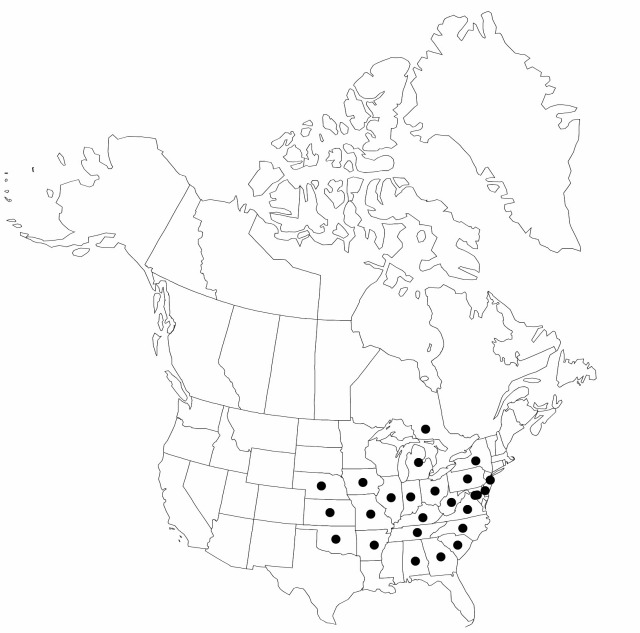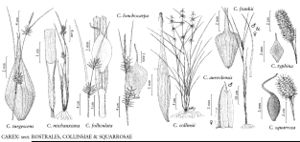Difference between revisions of "Carex frankii"
Enum. Pl. 2: 498. 1837.
FNA>Volume Importer |
FNA>Volume Importer |
||
| Line 29: | Line 29: | ||
|elevation=0–1500 m | |elevation=0–1500 m | ||
|distribution=Ont.;Ala.;Ark.;Del.;D.C.;Ga.;Ill.;Ind.;Iowa;Kans.;Ky.;Md.;Mich.;Mo.;Nebr.;N.J.;N.Y.;N.C.;Ohio;Okla.;Pa.;S.C.;Tenn.;Va.;W.Va. | |distribution=Ont.;Ala.;Ark.;Del.;D.C.;Ga.;Ill.;Ind.;Iowa;Kans.;Ky.;Md.;Mich.;Mo.;Nebr.;N.J.;N.Y.;N.C.;Ohio;Okla.;Pa.;S.C.;Tenn.;Va.;W.Va. | ||
| − | |discussion=<p>Carex frankii and the similar C. aureolensis are two of the most easily recognized species of sedge; they are identified by the approximate, erect pistillate spikes and the long-awned pistillate scales that exceed the perigynia bodies.</p> | + | |discussion=<p><i>Carex frankii</i> and the similar <i>C. aureolensis</i> are two of the most easily recognized species of sedge; they are identified by the approximate, erect pistillate spikes and the long-awned pistillate scales that exceed the perigynia bodies.</p> |
|tables= | |tables= | ||
|references= | |references= | ||
| Line 53: | Line 53: | ||
|publication year=1837 | |publication year=1837 | ||
|special status= | |special status= | ||
| − | |source xml=https://jpend@bitbucket.org/aafc-mbb/fna-data-curation.git/src/ | + | |source xml=https://jpend@bitbucket.org/aafc-mbb/fna-data-curation.git/src/8f726806613d60c220dc4493de13607dd3150896/coarse_grained_fna_xml/V23/V23_968.xml |
|genus=Carex | |genus=Carex | ||
|section=Carex sect. Squarrosae | |section=Carex sect. Squarrosae | ||
Revision as of 16:12, 18 September 2019
Plants cespitose, short-rhizomatous. Culms 18–80 cm. Leaves 2.5–11.5 mm wide, sparingly scabrous. Spikes 3–7(–9), erect; lateral spikes pistillate with few staminate flowers at base and rarely also at apex, narrowly elliptic, 12–50 × 7–13 mm; terminal spike usually staminate, sometimes gynecandrous, pistillate, or abortive, 6–45 × 2–6 mm. Pistillate scales narrow, with indistinct body, 3.6–9(–11) × 0.1–0.4 mm, apex with long, scabrous awn exceeding perigynium. Staminate scales loosely to irregularly imbricate with tips spreading, linear, 4.3–15 × 0.3–0.8 mm, apex with long, scabrous awn. Perigynia horizontal, 3.5–6 × 1.4–2.6 mm, minutely pustulate; beak 1.3–2.2 mm, smooth. Achenes obovoid, sides strongly concave, 1.4–2.1 × 1–1.4 mm, less than 2 times as long as wide; style deciduous, straight or sinuous.
Phenology: Fruiting summer.
Habitat: Wet meadows and woods, muddy margins of lakes and ponds, roadside ditches
Elevation: 0–1500 m
Distribution

Ont., Ala., Ark., Del., D.C., Ga., Ill., Ind., Iowa, Kans., Ky., Md., Mich., Mo., Nebr., N.J., N.Y., N.C., Ohio, Okla., Pa., S.C., Tenn., Va., W.Va.
Discussion
Carex frankii and the similar C. aureolensis are two of the most easily recognized species of sedge; they are identified by the approximate, erect pistillate spikes and the long-awned pistillate scales that exceed the perigynia bodies.
Selected References
None.
